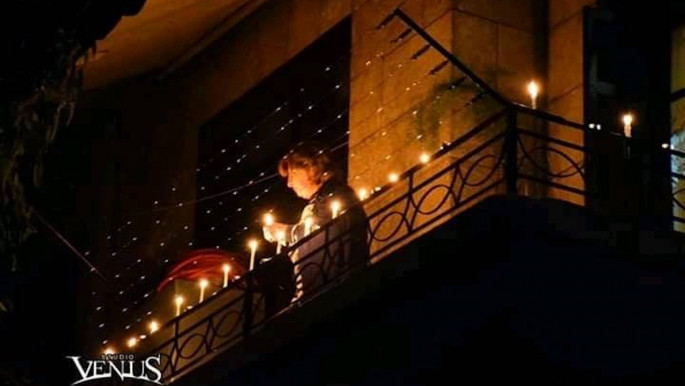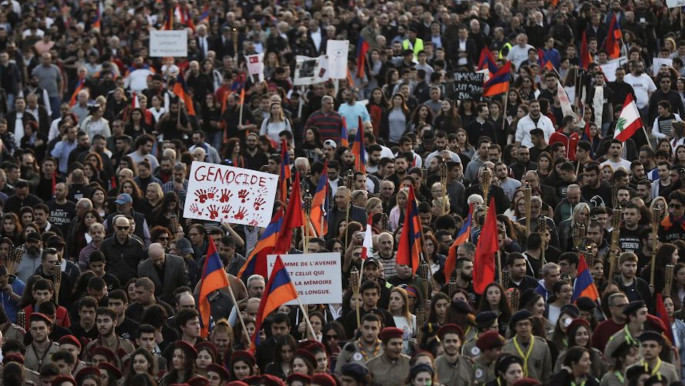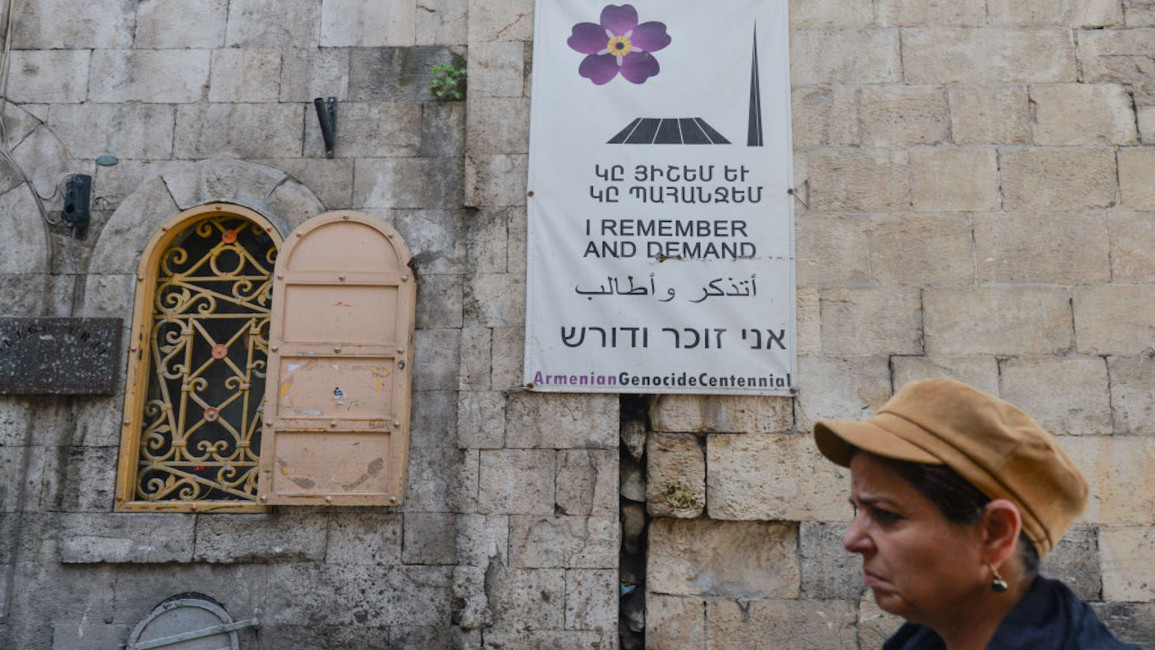Armenians across coronavirus-hit Middle East commemorate 105th genocide anniversary with vigils and online ceremonies
As Armenia's capital Yerevan dimmed its lights on Thursday evening, paying tribute to the victims of the Armenian Genocide, the Armenian diaspora in the Middle East followed the country's lead, adapting commemmoration ceremonies to adhere to coronavirus lockdown measures.
Armenians in Lebanon, Syria, Iran and Jordan lit candle vigils on their balconies and used social media platforms to disseminate the photos, as well as covers of traditional Armenian songs and artwork.
Every year, Armenians in the region hold an annual march on the 24th of April to remember the genocide – in which well over a million Armenians died between 1914 and 1923 at the hands of the Ottoman Empire and thousands were displaced after surviving death marches to Syria.
Turkey, the successor state of the Ottoman Empire, denies a genocide was carried out, despite many states around the world officially recognising it owing to years of Armenian activism, some criminalising its denial.
Turkish officials have often justified the mass deportation and killings of Armenians during the First World War by referring to the "rebellion" of armed Armenian groups against Ottoman rule.
While some Armenians may have been involved in fighting against the Ottoman Empire, most were innocent civilians, including women and children, according to international scholars.
Historians estimate around 1.5 million Armenians were killed in what many scholars call the first genocide of the 20th century, although Turkey disputes this.
In annual remembrance ceremonies, diaspora Armenians close their businesses and shops or take days off from their work to participate in the ceremonial march, hold vigils at genocide monuments and visit the graves of their grandparents and forefathers.
 |
| Aleppo's Armenians illuminated balconies with candles [VENUS] |
This year – with all non-essential businesses closed in Lebanon, Syria Jordan, and Iran, home to the largest Armenian diaspora communities in the region, and large public gatherings banned, Armenians had to adapt their commemorations and activism to adhere to social distancing measures and other restrictions.
Lebanon's Armenians
In Lebanon, home to the most sizeable Armenian community in the Arab world as a direct result of the exodus during the genocide – second-largest to Iran in overall Armenian diaspora population – the Armenian church-affiliated Cilicia TV's Facebook page broadcasted a torch-carrying tour of Lebanon on a small motorcade.
The convoy toured Beirut's streets, passing through the predominently-Armenian Bourj Hammoud neighbourhoods, while a man standing in the back of one vehicle held the blazing torch.
The torch eventually reached an Armenian church, where social-distanced traditional performances took place in the courtyard in the absence of a live audience.
|
The four-hour video aired live on Thursday night showed families peeking from balconies glimmering with candlelight to watch the torch pass.
While the yearly march gathers on average tens of thousands of Armenians in Lebanon's capital, the experience this year was remarkably different for most of Lebanon's Armenians who tuned in from their homes.
Despite the restriction on movement and other difficulties, Lebanese-Armenians interviewed by The New Arab said the online ceremonies evoked a sense of a larger-than-usual community.
Annie Tabakian, a communication coordinator at the Lebanese American University, said she often requests a day off on the 24th of April to participate in the march or go to church. This year, with universities closed, Tabakian's experience was slightly different.
"I can't believe how amazing it is this year. The fact that the commemoration started in the real world with people driving around in Beirut and putting candles and then it continued online," Tabakian said, adding that she spotted the symbolic 'Forget-Me-Not' flower on most social platforms.
"It's like you are marching not for an hour, but for the entire day," Tabakian said.
Other active community groups, such as Armenians in Lebanon shared videos from monuments and memorial sites where vigils were held for online mourners.
The group's admins – Nazareth Patchanian, Georges Tachdjian and Arine Kabassakalian – told The New Arab that despite the coronavirus-imposed restrictions this year, the online format of activism and remembrance drew online crowds beyond Lebanon.
"We noticed that a lot of people from around the world are participating, especially those from the new generation," the group said.
Read also: A shared agony: from Aintab to Haifa
 |
| Thousands rally in Lebanon every year marking the date [AFP] |
Arpie Minassian, a Lebanese-Armenian who now resides in the US was among those who tuned in to see Lebanon’s commemoration activities.
"It was a very different commemoration for the 105th anniversary. While sitting at home, we re-lived the memories of our martyrs with profound feelings of both sadness and excitement," Minassian wrote in a comment on one of the videos.
Iconic Armenian church in Syria holds blood donation campaign
In neighbouring Syria, where around 100,000 Armenians lived before the war, Aleppo's Armenians joined in on Thursday night's vigils, after a blood donation event held at a church earlier in the day.
Kantsasar, an Armenian daily in Syria reported that 136 people – including religious figures – donated blood to the national blood bank inside the iconic Surp Asdvadzadzin (St. Mary) Armenian Apostolic Church of Aleppo.
In February this year, the Syrian regime's Parliament unanimously adopted a resolution recognising and condemning the Armenian Genocide, a move that was welcomed by Aleppo's remaining Armenians, but heavily blasted by those who had fled Syria’s war as posturing against rival Turkey.
One Syrian-Armenian migrant, who spoke on conditions of anonymity, said the regime's recognition was a politically-motivated tactic which was only announced to spite Turkey after tensions soared.
According to the Times more than 15,000 Armenians from Syria have left for Republic of Armenia since the war broke out eight years ago.
Genocide commemorations beyond Lebanon, Syria
For many Syrian-Armenians abroad, the commemoration brings back bitter memories of having to escape Syria's war, as well as passed-down memories of the exodus from more than the century-old genocide.
Many Armenians who lost their homes to Syria's conflict and left the country say they were 'uprooted' yet again, often reiterating the gist in a over-simplified phrase that makes its way into casual daily conversations: "This was a second genocide to Armenians".
|
Armenians in the Islamic Republic of Iran marked the genocide's anniversary with church ceremonies that were broadcast live on Instagram via the @armeniangenocide_nj account, which also posted vigil photos submitted by Iranian Armenians.
A similar broadcast by the Armenian Apostilic church of Jordan was aired on Thursday morning, while church representatives announced the ceremony was closed to the public.
"Pandemics kill and are devastating. But so are Human Genocides," Egyptian-Armenian Kegham Papazian wrote in one of the Armenian community facebook groups, calling on people to join the 'virtual march' from their homes.
While no official documentations denoting the exact number and corresponding names of all genocide victims exists, the University of Minnesota's Center for Holocaust and Genocide Studies has compiled figures by province and district that show the number of Armenians in the Ottoman Empire decreased from over 2.1 million in 1914 to only about 387,800 by 1922.
The genocide carried out by the Ottoman Empire also killed scores of Assyrians and Greeks, according to historians.
Gasia Ohanes is a journalist with The New Arab.
Follow her on Twitter: @GasiaOhanes



